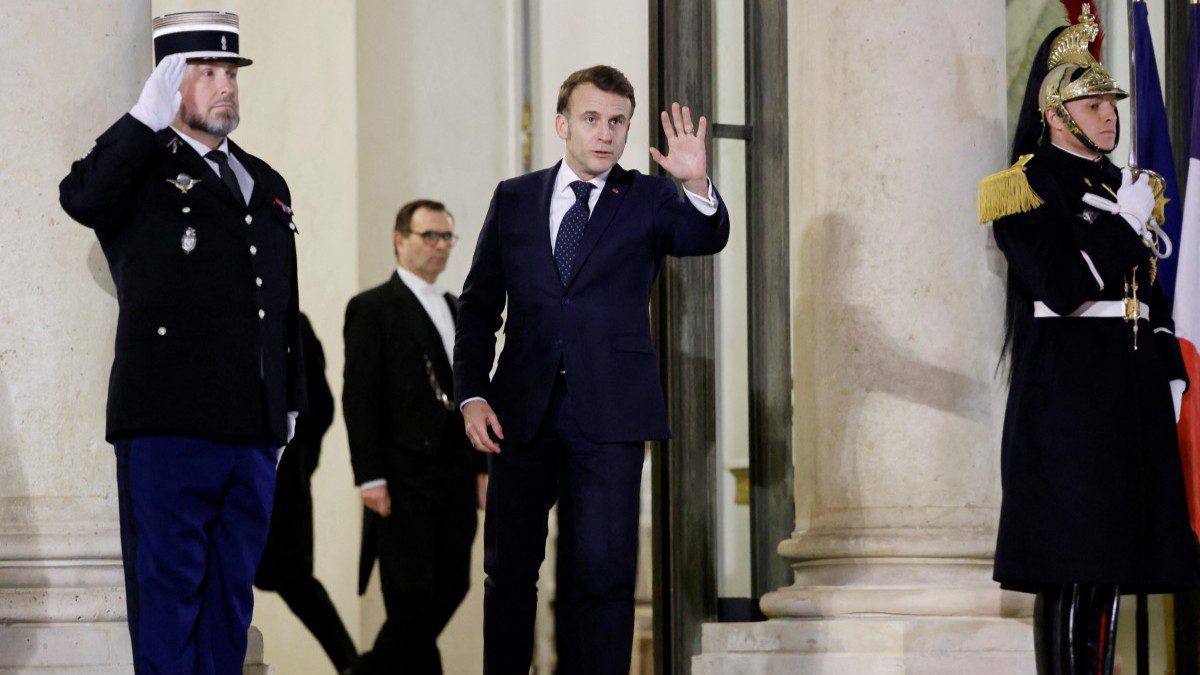
French President Emmanuel Macron waves after an informal summit of European leaders to discuss the situation in Ukraine and European security at the Élysée Palace in Paris on February 17, 2025.
Ludovic Marin / AFP
This Wednesday, February 19th, European leaders are once again gathering in Paris to define a common response following the initial U.S.-Russia peace talks on Ukraine. The fact that these negotiations occurred without Brussels’ involvement has left the European Union in a diplomatic crisis—one that they surprisingly did not foresee. Wednesday’s meeting follows Monday’s gathering, which failed to produce a consensus on Europe’s position in this new geopolitical reality.
Some representatives, like Italy’s Giorgia Meloni, openly expressed their discontent through words and actions, as shown in the images from the last event. Meloni attended reluctantly, arriving 45 minutes late. Her team had already leaked their disagreement with the meeting’s format, and her delay—viewed as a protest—reinforced her stance that the summit was a mistake.
Her attitude highlighted the EU’s struggle to establish a unified strategy and emphasized the failure of Monday’s summit. In response, French president Emmanuel Macron announced a second meeting to include excluded countries, such as Norway, Canada, the Czech Republic, Greece, Finland, Sweden, Belgium, and the Baltic states.
The summit lasted three and a half hours but failed to reach a consensus. Macron, flanked by Spanish PM Pedro Sánchez and German chancellor Olaf Scholz, avoided issuing final statements or a joint communiqué due to the deep divisions among the participants. Even within France, skepticism arose. Prime Minister François Bayrou compared the situation to the 1930s, warning that the meeting failed to clear the approaching “icebergs”—an apparent reference to the U.S.-Russia negotiations in Riyadh, from which Europe and Ukraine were excluded.
European leaders are now divided between two approaches: a more aggressive stance that could include deploying troops to Ukraine, or a wait-and-see strategy to observe Trump and Putin’s next moves following their Riyadh summit.
EU High Representative for Foreign Affairs Kaja Kallas has called Russia’s peace offer a “trap,” suggesting that any agreement lacking active European participation would be a strategic victory for Moscow. “If the deal does not include Europe and Ukraine, it will simply fail because it cannot be implemented,” Kallas stated in a recent interview.
With rhetoric reminiscent of Orwellian thought—where “peace is war”—Kallas called for a significant increase in military support for Ukraine and a consolidation of European defense. “We must ensure that Ukraine is in a strong position to reject a bad deal,” she insisted. She further warned, “Russia will try to divide us. Let’s not fall into their traps.” While the idea that Moscow intends to invade the European Union is hard to believe, such rhetoric remains effective in pushing specific agendas.
Against this backdrop, advancing toward a European army is gaining traction again. Europe’s lack of influence in the peace negotiations has catalyzed Brussels to reconsider its defense dependence on the United States. European Commission President Ursula von der Leyen has clarified that increasing military spending will be a priority in the coming months. “To be credible, we must step up our defense spending,” von der Leyen declared.
Despite the urgent need for a coordinated response, the divisions within the European Union have become increasingly evident. While France and Germany advocate for greater strategic autonomy, other countries, such as Poland and the Baltic states, continue to rely on U.S. protection through NATO.
Additionally, some European People’s Party (EPP) leaders have expressed frustration at being excluded from the first Paris meeting. The lack of a unified approach risks weakening the EU’s position at a critical moment for the continent’s security.
As Europe continues debating its role in the conflict, the U.S. and Russia may proceed with shaping a new international order, one in which the EU has little say. Today’s meeting in Paris could be decisive in determining whether the EU takes a firm stand or continues to react fragmentedly to Washington and Moscow’s maneuvers.
What remains clear is that Europe’s defense and security policy stands at a crossroads. The absence of a common strategy could push the bloc into geopolitical irrelevance, whereas a decisive response could accelerate the EU’s military integration and independence from U.S. influence. However, questions linger: with what purpose, under what values, and to what end? Suppose the solution to the current situation follows the same path Brussels has taken over the past decades. In that case, many will continue to raise legitimate doubts about the EU’s cohesion and unity projects.
